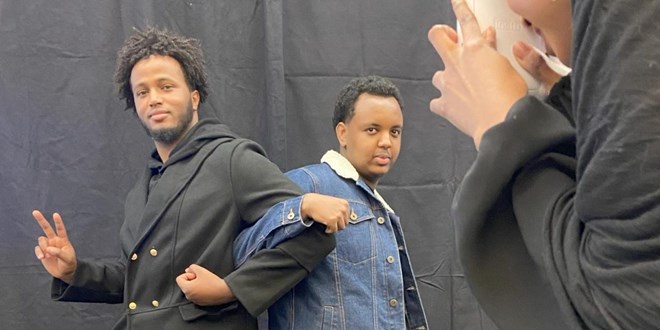[ad_1]

Thursday February 8, 2024
By Katrina Bailey and Alexandra DeYoe
University student groups speak out about how they feel about the rising stress.

Mowlid Hassan (left) and Abdimalik Shuriye (right) pose at the Somali Student Association spring kickoff event on Jan. 29.
University of Minnesota students reflect on concerns of safety and peace as tensions rise between Somalia and Ethiopia.
Tensions between the two countries rose after Somaliland, a neighboring territory, signed an agreement with Ethiopia to lease a part of its coastline to the landlocked nation for the next 50 years. East African University students voiced concerns about how the tensions are impacting themselves, their friends and family.
Somaliland was a former British colony until 1960 when it joined Somalia. It was an unstable union between the two and in 1991, Somaliland broke away with intentions to become an independent, sovereign nation and started a civil war.
Some University students have family and friends in Somalia affected by these conflicts, making this subject personal.
Mowlid Hassan, the committee chair of the Somali Student Association, is worried about his family’s safety. His uncle lived in Las Ahanov, Somalia, one of the regions where the conflict started before moving south to Bohol, where his dad lives.
“It’s affecting me in the sense of thinking about my family’s safety,” Hassan said. “Hopefully things get better.”
Freda Payne, the co-president of the African Student Association, said her friends are worried about being perceived the wrong way. Payne has friends from both Ethiopia and Somalia and is worried about how the conflict could create tensions here.
“It’s not affecting them day-to-day but it’s like, if they consider going back to their own countries they’re more worried of how they’re going to be perceived by others,” Payne said.
For Ethiopia, the agreement is vital to its economic stability because it is a landlocked nation and gives them access to the ocean. In return, Somaliland hopes Ethiopia will recognize them as a sovereign state, not just a separate region in Somalia.
Abdimalik Shuriye, the board historian of the Somali Student Association at the University, said protests are happening in all three areas because of sovereignty disputes and lack of communication.
“It would be like if another country was dealing with Minnesota instead of dealing with the United States,” Shuriye said.
President of Somalia Hassan Sheikh Mohamud said this agreement bypasses their federal government and threatens their nation’s integrity, reported Al Jazeera news.
Mohamud said Somalia is prepared to go to war with Ethiopia and has declared the agreement void, reported The Guardian. Ethiopia and Somalia have had ongoing tensions after their conflict in 1977-78 about a disputed region.
Hassan points out the majority of Somalia’s population is young and feeling the effects of the past generation’s actions.
“Most of the Somalis on Earth are younger than the age of 30, meaning they didn’t even know the start of the civil war,” Hassan said. “It’s something that affects them that the past generation has done.”
It is unlikely Somalia will initiate an attack, though the agreement could increase longstanding tensions, according to The Guardian. East African students hope the two nations will focus on peace moving forward.
“People need to focus on peace,” Shuriye said. “I feel like it’s just gonna hopefully all come out peacefully.”
[ad_2]
